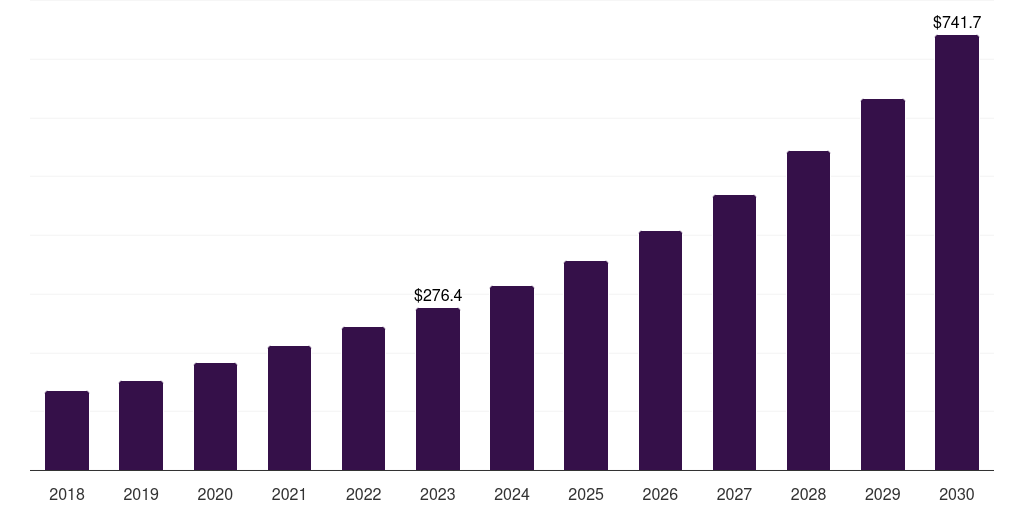South Korea Cell Culture Media Market Size & Outlook
South Korea cell culture media market, 2018-2030 (US$M)

Related Markets
South Korea cell culture media market highlights
- The South Korea cell culture media market generated a revenue of USD 256.6 million in 2024 and is expected to reach USD 584.5 million by 2030.
- The South Korea market is expected to grow at a CAGR of 15.2% from 2025 to 2030.
- In terms of segment, serum-free media was the largest revenue generating product in 2024.
- Serum-free Media is the most lucrative product segment registering the fastest growth during the forecast period.
Cell culture media market data book summary
| Market revenue in 2024 | USD 256.6 million |
| Market revenue in 2030 | USD 584.5 million |
| Growth rate | 15.2% (CAGR from 2025 to 2030) |
| Largest segment | Serum-free media |
| Fastest growing segment | Serum-free Media |
| Historical data | 2018 - 2023 |
| Base year | 2024 |
| Forecast period | 2025 - 2030 |
| Quantitative units | Revenue in USD million |
| Market segmentation | Serum-free Media, Classical Media, Stem Cell Culture Media, Chemically Defined Media, Specialty Media, Other Cell Culture Media |
| Key market players worldwide | Sartorius AG, Danaher Corp, Merck KGaA, Thermo Fisher Scientific Inc, FUJIFILM Holdings Corp, Lonza Group Ltd, BD, STEMCELL Technologies, PromoCell GmbH |
Other key industry trends
- In terms of revenue, South Korea accounted for 6.0% of the global cell culture media market in 2024.
- Country-wise, U.S. is expected to lead the global market in terms of revenue in 2030.
- In Asia Pacific, China cell culture media market is projected to lead the regional market in terms of revenue in 2030.
- China is the fastest growing regional market in Asia Pacific and is projected to reach USD 663.4 million by 2030.
Serum-free media was the largest segment with a revenue share of 39.83% in 2024. Horizon Databook has segmented the South Korea cell culture media market based on serum-free media, classical media, stem cell culture media, chemically defined media, specialty media, other cell culture media covering the revenue growth of each sub-segment from 2018 to 2030.
The Pharmaceutical Affairs Act is the main legislation that the Ministry of Food and Drug Safety uses to govern cellular therapy products (PAA). Cell therapy products are considered biologic products under the PAA. The regulatory framework for biologic goods is described in depth through seven rules and eight guidelines. The Regulation on Investigation New Drug Application for Medicinal Products and Regulation on Review and Authorization of Biological Products are the two main regulations that offer marketing authorization for biologic products.
Minimally altered cellular remedies developed by research institutions and human tissue regulated under the Human Tissue Safety and Control Act are the two exclusions to PAA biologic product regulations. Moreover, the Bioethics Act regulates research on embryonic stem cells and implementation of in vitro fertilization. Several South Korean bioethical policies are based on this act and it has also played a central role in the establishment of the National Bioethics Committee, which oversees stem cell research in South Korea.
Similarly, two other organizations, the Ministry of Health and Welfare and the World Stem Cell Hub at Seoul National University, have outlined guidelines for management of stem cells in the country. Furthermore, the National Bioethics Committee is the central organization that addresses the Bioethics Act and reviews bioethics policies in South Korea.
No credit card required*
Horizon in a snapshot
- 30K+ Global Market Reports
- 120K+ Country Reports
- 1.2M+ Market Statistics
- 200K+ Company Profiles
- Industry insights and more
Cell Culture Media Market Scope
Cell Culture Media Market Companies
| Name | Profile | # Employees | HQ | Website |
|---|
South Korea cell culture media market size, by product, 2018-2030 (US$M)
South Korea Cell Culture Media Market Outlook Share, 2024 & 2030 (US$M)
Related regional statistics
Sign up - it's easy, and free!
Sign up and get instant basic access to databook, upgrade
when ready, or enjoy our
free plan indefinitely.
Included in Horizon account
- 30K+ Global Market Reports
- 120K+ Country Reports
- 1.2M+ Market Statistics
- 200K+ Company Profiles
- Industry insights and more


